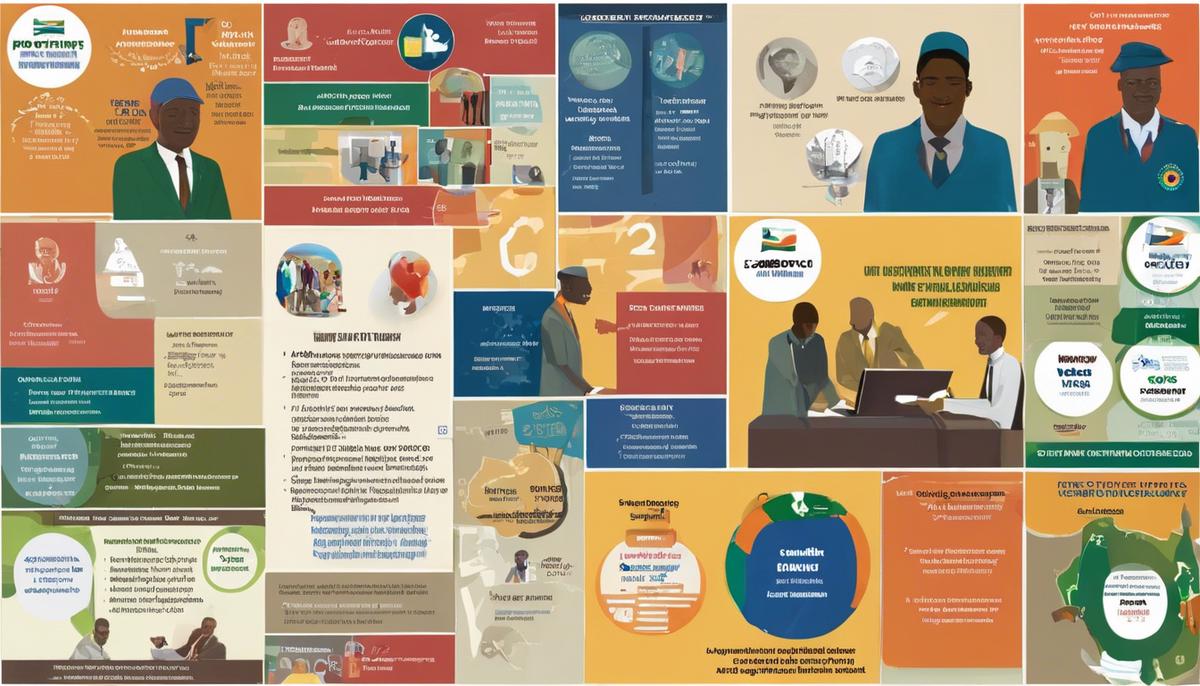
700K Jobs Promise by Labour Minister
Overview of Unemployment in South Africa
Unemployment in South Africa continues to be a significant issue, particularly among the youth. Recent reports highlight the high unemployment rates, with 56.4 percent of the country’s youth aged 15–24 struggling to find work. The situation underscores the need for effective solutions from both the government and the business sector.
Amidst these challenges, there are efforts to address the crisis, including:
- Budget allocations from the Social Development department
- Initiatives like the SA SME Fund and the Jobs Fund aimed at empowering young entrepreneurs and stimulating job creation
These efforts acknowledge the importance of tackling unemployment to ensure a brighter future for South Africa’s youth.
Solutions and actions are being considered to improve South Africa’s economy and address its unemployment problem. Programs like the National Labour Migration Policy (NLMP) and amendments to the Employment Services Act emphasize the government’s commitment to refining labour laws. Partnerships between public, private, and non-governmental organisations aim to unlock job opportunities and foster an environment conducive to economic growth. The engagement with trade unionists and the exploration of ideas to grow the economy serve as testament to the resolve to combat unemployment. Despite the challenges, these initiatives offer hope for reducing unemployment rates and laying the groundwork for economic development in South Africa.

Labour Minister’s 700,000 Jobs Promise
The recent uproar surrounding Finance Minister Enoch Godongwana and the subsequent legal confrontations signal a society focused on integrity, accountability, and transparency in executing its economic interventions. These actions underscore a public expectation for government officials to spearhead initiatives that actualize job creation and economic revitalization. It brings to light the challenges facing South Africa as it strides towards repositioning itself on the path of inclusivity and prosperity.
Initiatives like the SA SME Fund and adjustments to the Employment Services Act underline a move towards harnessing the potential of small and medium enterprises (SMEs) and leveraging policy frameworks to streamline the labor market. Amid promises of creating over 700,000 jobs is the assertion of embarking on ventures that harmonize public, private, and civil society endeavors. These moves attest to a realization within South African governance frameworks of the need for policies that are proactive. There lies the anticipation for collaborative engagements that bridge existing gaps, innovate within distressed economies, and build toward an inclusive society where unemployment is reduced.
Challenges and Implementation
Addressing unemployment in South Africa requires a multifaceted approach, ensuring that strategic interventions are robust and widely encompassing. Enhancing the tech and innovation-focused sectors is a critical step. The public-private partnership between the SA SME Fund and the Technology Innovation Agency underscores a move towards nurturing tech-based startups, particularly those led by black entrepreneurs. This initiative promises to invigorate the tech landscape with fresh energy and drive job creation across sectors. By focusing on the commercialization of local innovations and supporting ventures in biotechnology and hardware technology, South Africa is gradually paving the way for a modernised, inclusive economy. This approach leverages the country’s existing strengths and channels them into areas with growth and employment creation potential.
At the heart of South Africa’s unemployment challenges are programs aiming at supporting and incubating new businesses, particularly those conceptualized by the youth and disenfranchised communities. Incubator initiatives have shown promise by facilitating access to:
- Markets
- Finance
- Business networks
Success stories from these initiatives demonstrate the potential for small and medium enterprises (SMEs) to contribute to the country’s economic fabric. By emphasizing skills development and entrepreneurship within historically marginalized groups, these programs aim to mitigate the high unemployment rates through sustainable means. Bolstering these efforts through ongoing support, mentorship, and resource access is vital for nurturing a resilient economy marked by innovation and inclusivity. As these initiatives unfold, monitoring their impact and scalability will be crucial in achieving the goal of job creation and ensuring long-term economic prosperity for South Africa.

Impact and Public Response
The reactions to the South African government’s pledge to create over 700,000 jobs have been significant, drawing attention from citizens, business leaders, and international observers. Concerns about unemployment, particularly among the country’s youth, have turned the populace’s gaze towards these measures with hopeful yet scrutinizing eyes. The public is eager for progress, reflecting the urgent necessity to mitigate economic stagnation. Meanwhile, businesses seem cautiously optimistic, envisaging a revived market and new growth opportunities. This collective anticipation underscores the yearning for employment, improved living standards, and economic mobility.
The interplay between government initiatives and public response is a crucible of hope, skepticism, and ambition. There’s a wariness rooted in past promises unmet, fermenting a sense of skepticism among the masses. On the other hand, there is excitement about the potential for economic upliftment, mainly through innovative sectors like technology and biotechnology, underscored by partnerships such as between the SA SME Fund and the Technology Innovation Agency. Community discussions often veer towards the tangible benefits of such initiatives: job creation, skill development, and entrepreneurship opportunities tailored to South African realities. These conversations, taking place in town halls and on social media, lay bare a society grappling with complex issues, striving for growth, and summoning its collective spirits towards lasting solutions for the unemployment challenge.

The initiatives aimed at combating unemployment in South Africa have the potential to transform lives and rejuvenate the economy. The focus on empowering young entrepreneurs and stimulating job creation through partnerships across various sectors offers hope. Tackling unemployment effectively requires more than just policies; it demands collective action and commitment towards fostering an inclusive society where every individual has the opportunity to thrive.
- Statistics South Africa. Quarterly Labour Force Survey (QLFS) – Q4:2021. Published February 2022.
- South African Government. National Labour Migration Policy (NLMP). Published 2022.
- SA SME Fund. About Us. Accessed 2023.

Share
Facebook
X
LinkedIn
Telegram
Tumblr
WhatsApp
VK
Mail